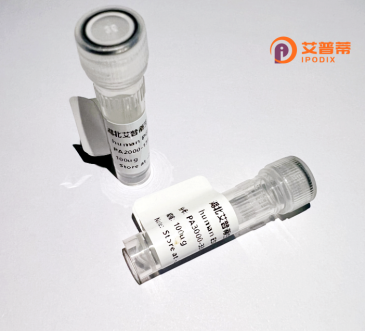
| 纯度 | >90%SDS-PAGE. |
| 种属 | Human |
| 靶点 | USP28 |
| Uniprot No | Q96RU2 |
| 内毒素 | < 0.01EU/μg |
| 表达宿主 | E.coli |
| 表达区间 | 1-583 aa |
| 活性数据 | MTAELQQDDAAGAADGHGSSCQMLLNQLREITGIQDPSFLHEALKASNGDITQAVSLLTD ERVKEPSQDTVATEPSEVEGSAANKEVLAKVIDLTHDNKDDLQAAIALSLLESPKIQADG RDLNRMHEATSAETKRSKRKRCEVWGENPNPNDWRRVDGWPVGLKNVGNTCWFSAVIQSL FQLPEFRRLVLSYSLPQNVLENCRSHTEKRNIMFMQELQYLFALMMGSNRKFVDPSAALD LLKGAFRSSEEQQQDVSEFTHKLLDWLEDAFQLAVNVNSPRNKSENPMVQLFYGTFLTEG VREGKPFCNNETFGQYPLQVNGYRNLDECLEGAMVEGDVELLPSDHSVKYGQERWFTKLP PVLTFELSRFEFNQSLGQPEKIHNKLEFPQIIYMDRYMYRSKELIRNKRECIRKLKEEIK ILQQKLERYVKYGSGPARFPLPDMLKYVIEFASTKPASESCPPESDTHMTLPLSSVHCSV SDQTSKESTSTESSSQDVESTFSSPEDSLPKSKPLTSSRSSMEMPSQPAPRTVTDEEINF VKTCLQRWRSEIEQDIQDLKTCIASTTQTIEQMYCDPLLRQVE |
| 分子量 | 122.4 kDa |
| 蛋白标签 | His tag N-Terminus |
| 缓冲液 | PBS, pH7.4, containing 0.01% SKL, 1mM DTT, 5% Trehalose and Proclin300. |
| 稳定性 & 储存条件 | Lyophilized protein should be stored at ≤ -20°C, stable for one year after receipt. Reconstituted protein solution can be stored at 2-8°C for 2-7 days. Aliquots of reconstituted samples are stable at ≤ -20°C for 3 months. |
| 复溶 | Always centrifuge tubes before opening.Do not mix by vortex or pipetting. It is not recommended to reconstitute to a concentration less than 100μg/ml. Dissolve the lyophilized protein in distilled water. Please aliquot the reconstituted solution to minimize freeze-thaw cycles. |
以下是关于重组人USP28蛋白的3篇代表性文献,简明概括供参考:
---
1. **文献名称**:*USP28 regulates MYC stability through deubiquitination*
**作者**:Popov et al.
**摘要**:研究揭示了USP28通过去泛素化作用稳定致癌蛋白MYC,促进肿瘤细胞增殖。实验中使用重组人USP28蛋白验证其与MYC的直接相互作用,并证明抑制USP28可降低MYC水平及肿瘤生长。
---
2. **文献名称**:*USP28 interacts with the spliceosome and regulates DNA repair pathways*
**作者**:Schülein et al.
**摘要**:发现USP28通过与剪接体复合物相互作用参与DNA损伤修复。研究者通过重组USP28蛋白进行体外泛素化分析,表明其调控BRCA1等修复蛋白的稳定性,影响细胞对放疗的敏感性。
---
3. **文献名称**:*Structural basis for USP28-mediated deubiquitination of Claspin*
**作者**:Zhang et al.
**摘要**:通过晶体结构解析,阐明USP28与底物Claspin结合的分子机制。研究利用重组USP28蛋白进行酶活实验,确认其去泛素化功能在细胞周期检查点中的关键作用,为靶向治疗提供结构基础。
---
如需具体文献链接或补充其他研究方向,可进一步说明。
USP28 (Ubiquitin-specific protease 28) is a deubiquitinating enzyme belonging to the ubiquitin-specific protease family, which regulates protein stability by reversing ubiquitination. It plays a critical role in multiple cellular processes, including DNA damage repair, cell cycle progression, and oncogenic signaling. Structurally, USP28 contains a conserved catalytic domain with characteristic Cys, His, and Asp residues essential for its enzymatic activity. Recombinant human USP28 protein is typically produced in expression systems like *E. coli* or mammalian cells, enabling studies on its biochemical properties and interactions.
USP28 is best known for stabilizing key oncoproteins (e.g., MYC, Claspin) and tumor suppressors (e.g., p53) by counteracting ubiquitin-mediated degradation. It interacts with the FBXW7 ubiquitin ligase complex, modulating substrates involved in cancer progression. USP28’s dual role—promoting genomic stability while enabling oncogenic growth—highlights its contextual importance in cancer biology. Dysregulation of USP28 is implicated in tumors, making it a potential therapeutic target. Current research focuses on inhibitors to disrupt its interaction with oncogenic clients.
Moreover, USP28 participates in cellular stress responses, coordinating with the 53BP1 and ATM/ATR pathways to resolve DNA damage. Its recombinant form is widely used to dissect deubiquitination mechanisms, screen small-molecule modulators, and explore crosstalk within ubiquitin-proteasome networks.
×